After a life turned upside down by conflict, Htan Wang craves peace and security in her Kachin homeland more than any democratic dividend promised by next month's Myanmar election.
Kachin is one of several borderlands where armed ethnic groups have sporadically fought the central government for nearly 70 years, in the world's longest running civil war.
Now 64, the frail grandmother-of-eight says she was captured by government troops in 2011 as war swept into her village after the collapse of a long-standing ceasefire between the army and ethnic Kachin fighters.
She recalls the terror of being caught in a days-long firefight after being forced to guide soldiers through her village.
"I became a part of the war even though I was not holding a gun," she told AFP, describing how she later escaped to be reunited with her family at a displacement camp near state capital Myitkyina.
Elections on November 8 are being billed as the freest in decades in a country ruled by a junta for much of its history since independence.
Political parties are promising development and greater devolved power as they try to tap up voters like Htan Wang from ethnic minority groups who comprise around a third of the country's 51 million people.
- 'Life filled with gunfire' -
Their task in war-weary Kachin is a mighty one.
At the St Joseph Maina displacement camp, officials say only around half of those 650 eligible have registered to vote as the fine-points of democratic debate are overshadowed by the more pressing needs of surviving war.
Htan Wang, one of more than 100,000 Kachin civilians to have fled their homes over the last four years, has registered to vote but is still undecided about which party to choose. Yet she is optimistic the polls will bring change.
"I think there will be peace after the election... How can we go on if life is filled with gunfire?"
Last weekend opposition leader Aung San Suu Kyi visited Kachin, weaving around battle zones to convince locals the National League for Democracy (NLD) can deliver peace and federalism to ethnic voters.
Wearing traditional Kachin clothes at a rally near Myitkyina, Suu Kyi insisted her party represents "the whole union," or an umbrella force over the ethnically diverse nation.
She is often seen as an outsider in ethnic regions as she comes from the ethnic Bamar majority and has also been accused of failing to speak out against conflict in Kachin.
But Myanmar's most famous politician still attracts flag-waving crowds.
"If mother Suu wins and can then sign a deal with ethnic groups, thing will be better for us. We are hoping for it," said ethnic Kachin Naing Linn the NLD rally.
The NLD is up against four newly-minted Kachin parties as well as the ruling army-backed Union Solidarity and Development party.
- 'Real peace, not fake' -
Myanmar's more than 130 ethnic minorities are mainly clustered in a horseshoe of rugged borderlands with distinct languages and cultures.
They have fought for greater political autonomy since independence from British rule in 1948 and complain of serious abuses by a military which has used the conflict as a pretext for clinging to power.
Around two thirds of the more than 90 parties registered in the elections represent minorities, according to the international advocacy group Transnational Institute.
In Shan state, which neighbours Kachin, and western Rakhine, local parties have built significant followings likely to challenge the NLD.
But their success could still be hindered by fighting, which continues in Shan states and Kachin's rugged hills despite government efforts to seal a nationwide ceasefire.
"If there is no security the election cannot be held successfully," said ManamTuJa, a former deputy leader of the political wing of the Kachin Independence Army, which has refused to sign the deal.
Peace, say locals, must also bring political empowerment to a state whose treasure trove of natural resources, including timber and jade, are an impetus for war and an impediment to halting it.
Civilians bitterly recall a previous 17-year-ceasefire that unravelled.
Then, the KIA colluded with the army in rampant logging and mining, enriching commanders but leaving ordinary people impoverished, said Tom Kramer from Transnational Institute.
"They want it (peace) real, they don't want it fake," he said.
©AFP
Buffeted by war, Myanmar ethnic groups crave peace after polls
06 October 2015
Buffeted by war, Myanmar ethnic groups crave peace after polls












